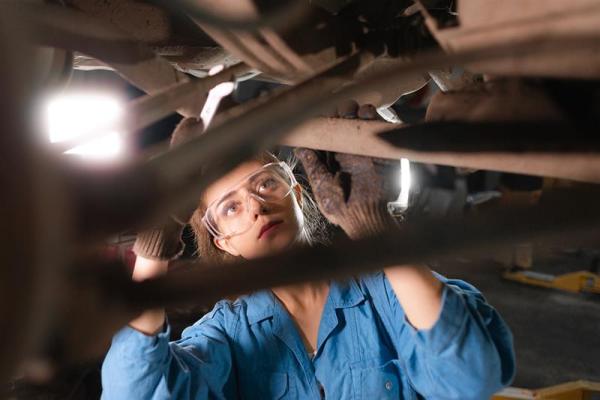Article
January 23, 2024, 2:00 PM EST
The Role of Building Community for Women in the Auto Industry

This article is the third of a three-part series, Women in Car Care, which details the challenges and opportunities for women in the automotive industry. By exploring recent statistics and speaking to women currently in the industry, the series highlights the evolving landscape and the tremendous potential for women to shape the future of car care.
When auto-industry veteran Kathy Gilbert attended big trade conferences in years past, she was always thrilled to meet another woman in the industry from the same city or region. "It would feel like, 'Why didn't I know you were here when I was making tough decisions?'" says Gilbert.
Her reaction makes sense, considering women are drastically underrepresented in the auto sector. Today, just 27.6% of U.S. workers in motor vehicle manufacturing are women, and that share is even smaller in auto retail (21.8% for dealerships; 15.1% for parts) and auto repair and maintenance (12.1%). Moreover, because of this lack of gender diversity, women have often felt like fish out of water in the industry's highly masculine culture, making it difficult for employers in the field to recruit and retain female workers.

One key factor that can help, according to a Deloitte survey of 330 female automotive leaders, is formal and informal mentorship and sponsorship opportunities—in other words, building community and connections.
Gilbert's 30 years of experience in the sector bears that out: "When you have someone you can talk to—another woman who has experienced some of the things that you have—your pathway changes."
Organizations Help Foster Connection
Gilbert feels so strongly about the vital role community, mentoring and networks play for women in the auto sector that she sits on the Governing Board for Women in Automotive. WIA, however, is just one of several organizations dedicated to the advancement and advocacy of women in the automotive industry.
Women in Automotive
WIA connects women through multiple networking and educational programs, including events where women can discuss topics like leadership, branding and navigating imposter syndrome. The group also focuses on mentorship to reflect women's stated needs.
Automotive Women's Alliance Foundation
Similarly, the Automotive Women's Alliance Foundation (AWAF) works to advance and empower women in automotive and related industries by providing mentoring, coaching, scholarships, outreach and professional development. As of August 2023, AWAF has awarded nearly $600,000 in scholarships to women pursuing careers in the automotive and mobility industry.
Automaker Networking Groups
Some large automakers have established their own networking groups, such as General Motors' Women's Retail Network. Its aim is to grow a performance-driven, customer-focused, profitable dealer network by connecting highly qualified women dealers.
"The benefits of the Women's Retail Network are awesome," says Brooke English of Coastal Chevrolet-Cadillac, in a 2022 video posted on WIA's YouTube channel. "Just having other women out there that are going through the same struggles, that are trying to overcome certain things—it's just invaluable what you get to share. It really means a lot to know I can go home and have a group to text or call if I need anything."
Finding Support Through Online Communities
While in-person communities can be important, some women in the industry are finding their "tribe" online. Currently, WIA is beta-testing an online community where members can network and receive training, coaching, mentorship, career assessments and more, all in one digital hub. They've also had success with their online "lunch and learn" webinars.
Online communities can also serve as a welcoming entry point for women who are interested in automobiles and want to learn more. For example, Women Auto Know—founded by Audra Fordin, a fourth-generation auto-shop owner and certified mechanic—aims to help women everywhere increase their basic automobile knowledge. From online workshops to livestream webinars and peer-to-peer support, groups like these can help peak women's interest and give them a foot in the door.
Women-Led Initiatives: Becoming Changemakers
Once women find their place in the auto sector, they're able to use their unique skills and outlook to become leaders and implement innovative solutions that help move the industry forward.
At Lakeland Toyota in Florida, for example, then assistant service manager Amber Smith looked at how things had always been done, then looked for ways to improve them. Though the dealership offered promotional financing that helped more clients get the parts, service and repairs they need, Smith began offering the financing to every customer, every time. Due to that simple change, the dealership saw a 300% bump in applications, helping it—and its customers—thrive.
The leadership qualities that led Smith to come up with her creative solution are commonly found in women, according to a report from McKinsey. In fact, gleaned from surveys of thousands of employees at hundreds of companies, the study found that women leaders bring more of the positive leadership traits—like the ability to effectively communicate new initiatives to colleagues and customers—associated with company success.
After analyzing 300 companies around the world, the researchers "found a difference in return on equity of 47% between the companies with the most women on their executive committees and those with none, and a 55% difference in operating results." In simpler terms, companies that have more women in their higher up positions tend to perform better financially compared to those with little to no women leaders.
Driving growth and improvement
Out-of-the-box thinking was also key for entrepreneur and participant of Synchrony's Banking on Women program, Christy Thomas, a lifelong car enthusiast who found she enjoyed providing custom paint jobs. She used her experience as a mobile detailer to create a new product: The Brush Buddy, a high-quality, handmade foaming brush that helps protect a car's finish while washing.
Thomas hopes more women will find their niche within an ever-growing auto industry to discover what brand of "car person" they are. Most importantly, though, she advises keeping the "right" network.
"If there is a passion there, and someone is burning that fire out, get away from those people," she said. "I've found my calling. I want to paint cars. If anyone gets in my way, they won't be in my life."
Looking to learn more about women in the auto industry? Jump back to Part 1 of Synchrony's Women In Car Care series, "How Reducing the Gender Gap Can Strengthen the Auto Industry, or Part 2, "Strategies for Change: How to Get More Women Working in the Auto Industry."






